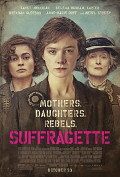
Directed by
Sarah Gavron
106 minutes
Rated M
Reviewed by
Sharon Hurst

Suffragette
Synopsis: Maud (Carey Mulligan) has worked since the age of seven in a London laundry, enduring horrific conditions and constant predation from her sleazy boss, Taylor (Geoff Bell). Maud is married to fellow worker, Sonny (Ben Wishaw), and they have a young son, George. When Maud gets caught up in a riot on the London streets she is made aware of the embryonic feminist movement and is gradually drawn into it by fellow sympathiser Violet (Anne-Marie Duff). Together with upper class women like Alice (Romola Garai) and pharmacist, Edith (Helena Bonham Carter), women from all walks of life come together to fight for the right to vote.
It’s hard to believe that barely more than 100 years ago women were second class citizens in Western society. Sure, the upper class swanned around and the middle class aped them but working class women endured the daily drudgery of ill-paid menial work and physical abuse at the hands of men with little hope of change. But the thing they all shared was that women had no say in the larger scheme of things as they were denied the right to vote.
Although some women had been campaigning for this right for 50 years or more, things didn’t get moving until Emmeline Pankhurst (played in a small role by Meryl Streep) came along. She moved the headquarters of the Women’s Social and Political Union to London in 1906, and what followed is history, with the vote being achieved for women (over thirty) in Britain in 1918.
What Suffragette achieves so successfully is showing the historical story through the eyes of the unknown players, those women, seen by Pankhurst as “foot soldiers”, who were prepared to give up everything for a cause they believed in. Many of the women endured successive prison sentences and physical violence at the hands of police and yet it is their fearless dedication that changed the course of history. Whether a downtrodden laundress and devoted wife and mother would have turned quite so quickly as Maud did into a fearless feminist is debatable, but Mulligan makes it credible, yet again playing, like last year’s Bathsheba Everdene in Far From The Madding Crowd, a determined young woman.
What surprised me, born to an era when street protest was acceptable, is how these woman were treated as subversive criminal although \ indeed, after years of peaceful protest, the women did resort to violence. Police Inspector Arthur Stead (Brendan Gleeson) heads up a surveillance team which tracks the women’s every movement, and whilst he may seem to have some sympathy with their cause he is ruthless in his pursuit of wrongdoers. Most of the other men, including police and many of the women’s husbands are steadfastly against the movement, allowing their defensive animosity to turn to physical abuse.
London of the era is faithfully recreated, opening with the oppressive, soul-destroying, dank conditions in the laundry where Maud works, made all the worse by Taylor’s exploitation of the girls. When the action moves to the Houses of Parliament, with Lloyd George listening to statements by the women testifying about their lives, it is feels suitably like the inner sanctum of a male-dominated world while scenes set at the Epsom Derby capture the upper-class feel of the event.
For all the skill of the production design the film never loses sight of its purpose which is to acknowledge the dedication and sacrifices of all the women involved in the battle for legal equality. Despite these achievements, as we know, there is still a long way to go before the sexes are truly equal in this country, let alone in so many other parts of the world. Suffragette, as much as it is historical, is an admirable contribution to that process.

Want more about this film?


Want something different?




